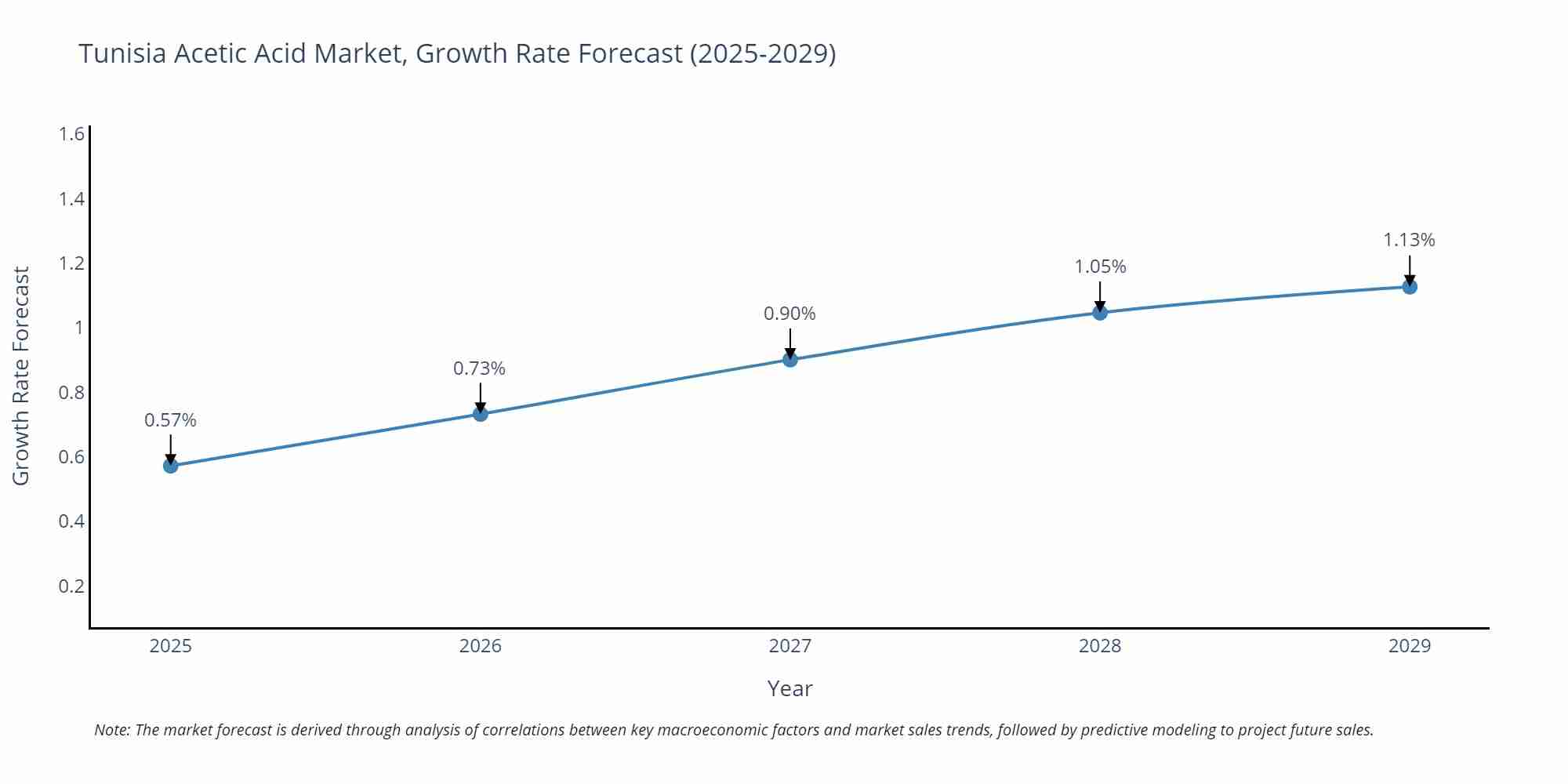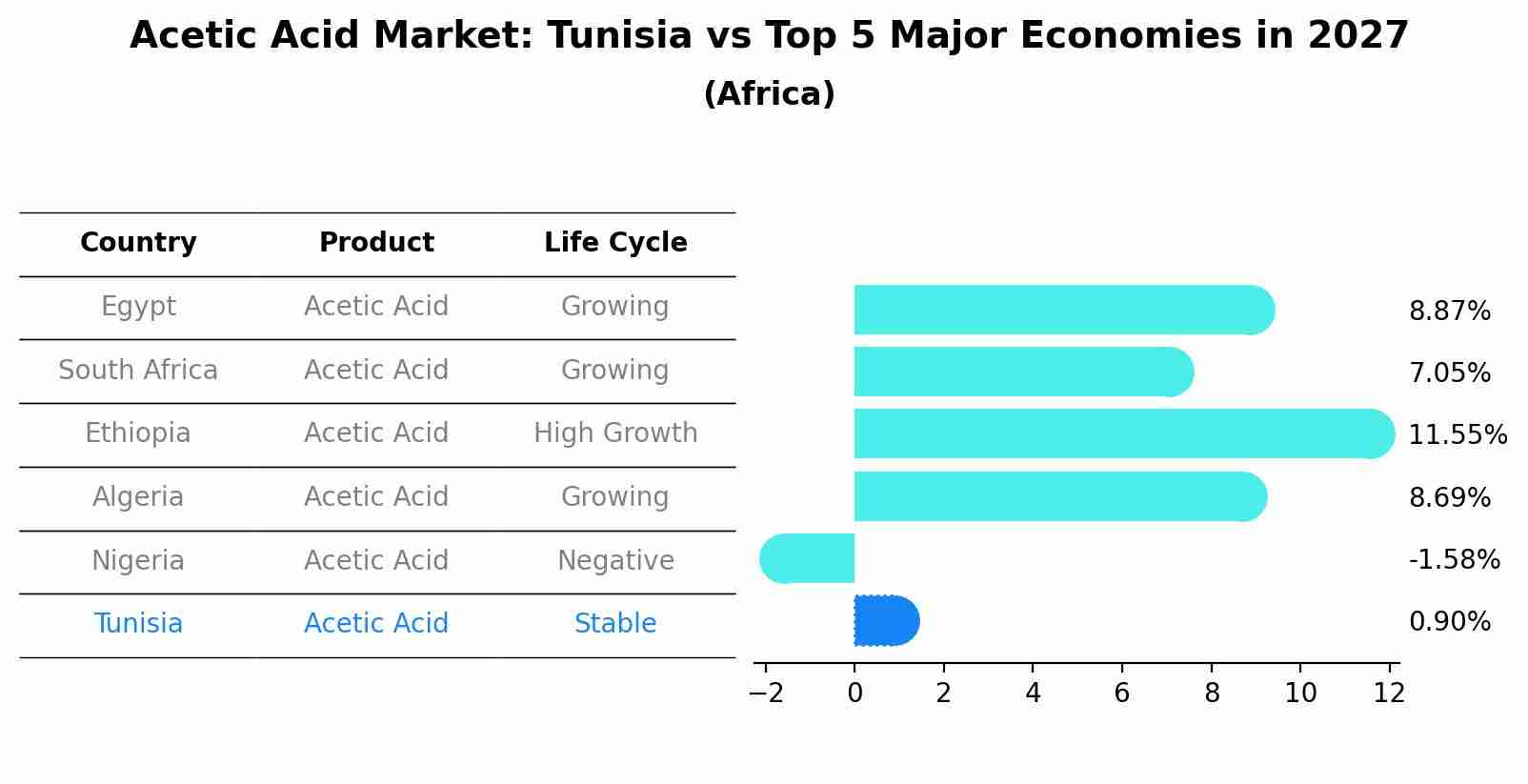Tunisia Acetic Acid Market Outlook | Value, COVID-19 IMPACT, Size, Revenue, Share, Trends, Growth, Forecast, Companies, Industry & Analysis
| Product Code: ETC411770 | Publication Date: Oct 2022 | Updated Date: Jul 2025 | Product Type: Market Research Report | |
| Publisher: 6Wresearch | Author: Shubham Deep | No. of Pages: 75 | No. of Figures: 35 | No. of Tables: 20 |
Tunisia Acetic Acid Market Size Growth Rate
The Tunisia Acetic Acid Market is poised for steady growth rate improvements from 2025 to 2029. From 0.57% in 2025, the growth rate steadily ascends to 1.13% in 2029.

Acetic Acid Market: Tunisia vs Top 5 Major Economies in 2027 (Africa)
The Acetic Acid market in Tunisia is projected to grow at a stable growth rate of 0.90% by 2027, highlighting the country's increasing focus on advanced technologies within the Africa region, where Egypt holds the dominant position, followed closely by South Africa, Ethiopia, Algeria and Nigeria, shaping overall regional demand.

Tunisia Acetic Acid Market Synopsis
The Tunisia Acetic Acid Market is experiencing steady growth driven by the increasing demand from various industries such as textiles, chemicals, and food processing. Acetic acid is primarily used in the production of vinyl acetate monomer (VAM) and polyvinyl acetate (PVA), which are essential in the manufacturing of adhesives, coatings, and paints. The market is also benefiting from the growing adoption of acetic acid in the pharmaceutical sector for the production of various drugs and chemicals. Key players operating in the Tunisia Acetic Acid Market include Tunisie Acide, Helm AG, and BP Chemicals. With favorable government policies, increasing industrialization, and rising investments in infrastructure development, the market is poised for further growth in the coming years.
Tunisia Acetic Acid Market Trends
The Tunisia Acetic Acid Market is currently experiencing steady growth due to increasing demand from various industries such as textiles, pharmaceuticals, and food processing. The market is witnessing a shift towards eco-friendly and sustainable production methods, with a focus on reducing carbon emissions and waste generation. Additionally, there is a growing preference for bio-based acetic acid derived from renewable sources as a more environmentally friendly alternative to traditional petroleum-based acetic acid. Technological advancements in production processes and increasing investments in research and development are expected to further drive the growth of the Tunisia Acetic Acid Market in the coming years. Overall, the market is poised for expansion driven by changing consumer preferences and a growing emphasis on sustainability.
Tunisia Acetic Acid Market Challenges
The Tunisia Acetic Acid Market faces several challenges including limited domestic production capacity, reliance on imports to meet demand, fluctuating raw material prices, and increasing competition from international suppliers. The market is also affected by regulatory issues, such as import restrictions and trade barriers, which can hinder growth and profitability for domestic producers. Additionally, the economic and political instability in the region can impact the overall market dynamics, leading to uncertainty and risk for industry players. Overall, the Tunisia Acetic Acid Market must navigate these challenges to ensure sustainable growth and competitiveness in the global market.
Tunisia Acetic Acid Market Investment Opportunities
In the Tunisia acetic acid market, there are several promising investment opportunities for investors to consider. One key opportunity lies in the growing demand for acetic acid in various industries such as textiles, food and beverage, and pharmaceuticals. As Tunisia continues to attract foreign investment and develop its manufacturing sector, the demand for acetic acid is expected to rise, presenting a favorable environment for investment in acetic acid production facilities or trading activities. Additionally, with the increasing focus on sustainability and environmentally friendly practices, there is potential for investments in bio-based acetic acid production technologies to cater to the evolving market trends. Overall, the Tunisia acetic acid market offers opportunities for investors to capitalize on the country`s industrial growth and emerging market dynamics.
Jordan Agar Market Government Policies
The Tunisian government has implemented policies to support the acetic acid market, focusing on promoting domestic production and reducing dependency on imports. The government offers incentives such as tax breaks and subsidies to local acetic acid producers to boost production capacity and enhance competitiveness. Additionally, there are regulations in place to ensure environmental sustainability and safety standards in acetic acid production processes. The government also aims to enhance research and development efforts in the sector to drive innovation and technological advancements. Overall, these policies aim to strengthen the domestic acetic acid market, reduce import reliance, and promote sustainable growth in the industry.
Tunisia Acetic Acid Market Future Outlook
The future outlook for the Tunisia Acetic Acid Market appears positive, driven by increasing demand from various industries such as textiles, plastics, and pharmaceuticals. The country`s growing manufacturing sector, coupled with government initiatives to attract foreign investments, is expected to further boost market growth. Additionally, the rising adoption of acetic acid in food preservation and as a cleaning agent is projected to contribute to market expansion. However, challenges such as fluctuating raw material prices and environmental regulations may impact market dynamics. Overall, with the increasing industrial activities and emerging applications of acetic acid, the Tunisia Acetic Acid Market is poised for steady growth in the coming years.
Key Highlights of the Report:
- Tunisia Acetic Acid Market Outlook
- Market Size of Tunisia Acetic Acid Market, 2021
- Forecast of Tunisia Acetic Acid Market, 2031
- Historical Data and Forecast of Tunisia Acetic Acid Revenues & Volume for the Period 2018 - 2031
- Tunisia Acetic Acid Market Trend Evolution
- Tunisia Acetic Acid Market Drivers and Challenges
- Tunisia Acetic Acid Price Trends
- Tunisia Acetic Acid Porter's Five Forces
- Tunisia Acetic Acid Industry Life Cycle
- Historical Data and Forecast of Tunisia Acetic Acid Market Revenues & Volume By Application for the Period 2018 - 2031
- Historical Data and Forecast of Tunisia Acetic Acid Market Revenues & Volume By Vinyl Acetate Monomer for the Period 2018 - 2031
- Historical Data and Forecast of Tunisia Acetic Acid Market Revenues & Volume By Acetic Anhydride for the Period 2018 - 2031
- Historical Data and Forecast of Tunisia Acetic Acid Market Revenues & Volume By Acetate Esters for the Period 2018 - 2031
- Historical Data and Forecast of Tunisia Acetic Acid Market Revenues & Volume By Purified Terephthalic Acid for the Period 2018 - 2031
- Historical Data and Forecast of Tunisia Acetic Acid Market Revenues & Volume By Ethanol for the Period 2018 - 2031
- Historical Data and Forecast of Tunisia Acetic Acid Market Revenues & Volume By Others for the Period 2018 - 2031
- Tunisia Acetic Acid Import Export Trade Statistics
- Market Opportunity Assessment By Application
- Tunisia Acetic Acid Top Companies Market Share
- Tunisia Acetic Acid Competitive Benchmarking By Technical and Operational Parameters
- Tunisia Acetic Acid Company Profiles
- Tunisia Acetic Acid Key Strategic Recommendations
Frequently Asked Questions About the Market Study (FAQs):
- Single User License$ 1,995
- Department License$ 2,400
- Site License$ 3,120
- Global License$ 3,795
Search
Thought Leadership and Analyst Meet
Our Clients
Related Reports
- Afghanistan Apparel Market (2026-2032) | Growth, Outlook, Industry, Segmentation, Forecast, Size, Companies, Trends, Value, Share, Analysis & Revenue
- Canada Oil and Gas Market (2026-2032) | Share, Segmentation, Value, Industry, Trends, Forecast, Analysis, Size & Revenue, Growth, Competitive Landscape, Outlook, Companies
- Germany Breakfast Food Market (2026-2032) | Industry, Share, Growth, Size, Companies, Value, Analysis, Revenue, Trends, Forecast & Outlook
- Australia Briquette Market (2025-2031) | Growth, Size, Revenue, Forecast, Analysis, Trends, Value, Share, Industry & Companies
- Vietnam System Integrator Market (2025-2031) | Size, Companies, Analysis, Industry, Value, Forecast, Growth, Trends, Revenue & Share
- ASEAN and Thailand Brain Health Supplements Market (2025-2031) | Strategy, Consumer Insights, Analysis, Investment Trends, Opportunities, Growth, Size, Share, Industry, Revenue, Segments, Value, Segmentation, Supply, Forecast, Restraints, Outlook, Competition, Drivers, Trends, Demand, Pricing Analysis, Competitive, Strategic Insights, Companies, Challenges
- ASEAN Bearings Market (2025-2031) | Strategy, Consumer Insights, Analysis, Investment Trends, Opportunities, Growth, Size, Share, Industry, Revenue, Segments, Value, Segmentation, Supply, Forecast, Restraints, Outlook, Competition, Drivers, Trends, Demand, Pricing Analysis, Competitive, Strategic Insights, Companies, Challenges
- Europe Flooring Market (2025-2031) | Outlook, Share, Industry, Trends, Forecast, Companies, Revenue, Size, Analysis, Growth & Value
- Saudi Arabia Manlift Market (2025-2031) | Outlook, Size, Growth, Trends, Companies, Industry, Revenue, Value, Share, Forecast & Analysis
- Uganda Excavator, Crane, and Wheel Loaders Market (2025-2031) | Strategy, Consumer Insights, Analysis, Investment Trends, Opportunities, Growth, Size, Share, Industry, Revenue, Segments, Value, Segmentation, Supply, Forecast, Restraints, Outlook, Competition, Drivers, Trends, Demand, Pricing Analysis, Competitive, Strategic Insights, Companies, Challenges
Industry Events and Analyst Meet
Whitepaper
- Middle East & Africa Commercial Security Market Click here to view more.
- Middle East & Africa Fire Safety Systems & Equipment Market Click here to view more.
- GCC Drone Market Click here to view more.
- Middle East Lighting Fixture Market Click here to view more.
- GCC Physical & Perimeter Security Market Click here to view more.
6WResearch In News
- Doha a strategic location for EV manufacturing hub: IPA Qatar
- Demand for luxury TVs surging in the GCC, says Samsung
- Empowering Growth: The Thriving Journey of Bangladesh’s Cable Industry
- Demand for luxury TVs surging in the GCC, says Samsung
- Video call with a traditional healer? Once unthinkable, it’s now common in South Africa
- Intelligent Buildings To Smooth GCC’s Path To Net Zero


















